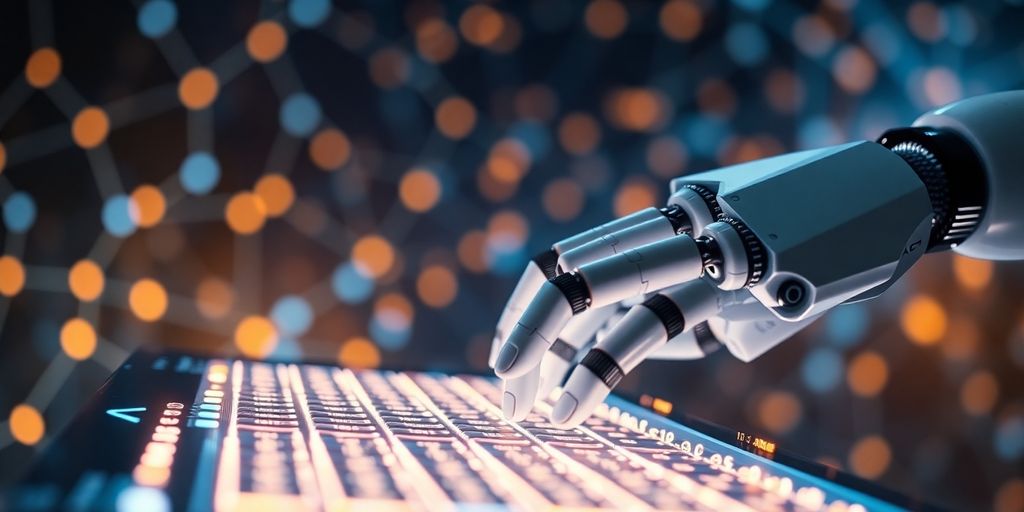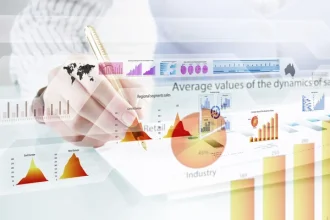You know, the software world is always changing, right? It feels like every other day there’s something new. But lately, one thing that’s really shaking things up is AI that code. It’s not just some fancy tech term; it’s actually changing how we build software, from the very first line of code to getting it out the door. This article is all about how this AI that code is making a big difference in software development.
Key Takeaways
- AI that code helps make code faster and better.
- AI that code finds bugs and makes sure software works right.
- AI that code makes project management easier and more efficient.
- AI that code changes how we do every step of software creation.
- AI that code is already being used by big companies and will keep growing.
Revolutionizing Code Generation with AI That Code
Automating Code Creation
AI is really changing how we make software. It’s not just about writing code faster, but also about exploring new possibilities. Think about it: AI can look at tons of code examples and figure out the best way to do something, maybe even better than a human would on their own. Tools like GitHub Copilot are already doing this, suggesting lines of code as you type. It’s like having a super-smart pair programmer that never gets tired.
- AI can generate code from simple descriptions.
- It helps find efficient solutions.
- It speeds up the whole development process.
The cool thing is that AI doesn’t replace developers; it helps them. Human developers are still needed to check the AI-generated code and make sure it’s doing what it’s supposed to do. It’s a team effort, with AI handling the repetitive stuff and humans focusing on the creative problem-solving.
Enhancing Developer Efficiency
AI can really boost how efficient developers are. Instead of spending hours writing the same code over and over, AI can automate a lot of that. This frees up developers to work on the harder, more interesting parts of the project. Plus, AI can help reduce errors, which means less time spent debugging. It’s like having a superpower that lets you get more done in less time. Augmented programming environments provide real-time feedback to developers.
- AI suggests code completions.
- It helps with optimization.
- It detects errors.
Reducing Development Time
One of the biggest benefits of using AI for code generation is that it can significantly reduce development time. AI can automate tasks, suggest code, and find errors faster than humans. This means projects can be completed sooner, and developers can move on to new challenges. It’s a win-win situation. Natural Language Processing is effective in automating code generation.
| Task | Time Saved (Estimated) |
|---|---|
| Code Generation | 30-50% |
| Debugging | 20-40% |
| Testing | 15-30% |
Improving Software Quality Through AI That Code

Advanced Bug Detection
Okay, so picture this: you’re staring at a screen full of code, and you’ve been at it for hours. Bugs are sneaky little things, right? They love to hide where you least expect them. But what if you had something that could find those bugs for you, almost like a super-powered magnifying glass? That’s where AI comes in. AI-driven tools can scan your code and spot potential problems way faster than any human could. We’re talking about catching errors, security holes, and performance issues before they even have a chance to cause trouble. It’s like having a tireless, eagle-eyed assistant who never misses a thing. Tools like DeepCode and SonarQube use AI to look for patterns of bugs and security vulnerabilities, even suggesting fixes. This means less time spent debugging and more time building cool stuff.
Intelligent Code Reviews
Code reviews can be a pain, let’s be honest. It’s not that people don’t want to do them, but everyone’s busy, and sometimes things get missed. AI can step in here too. Imagine an AI that can automatically review your code, looking for best practices, style issues, and potential improvements. It’s like having a senior developer looking over your shoulder, but without the awkwardness. These AI systems can provide real-time feedback and suggestions, helping you write cleaner, more efficient code. It’s not about replacing human reviewers, but about making the whole process smoother and more effective. Plus, it helps ensure that everyone on the team is following the same standards.
Automated Testing and Quality Assurance
Testing, testing, 1, 2, 3… nobody really loves manual testing, do they? It’s repetitive, time-consuming, and prone to human error. AI can automate a lot of the testing process, generating test cases, running them, and identifying issues without needing someone to sit there and click buttons all day. This not only saves time but also increases the accuracy of testing. AI algorithms can learn from past test results, improving their ability to detect problems over time. This means fewer bugs making it into the final product and a better experience for users. AI and ML can improve testing software through automation and predictive analytics. Moreover, as AI systems become more autonomous, gaining familiarity with AI red teaming—the process of stress-testing AI models to uncover weaknesses and security risks—will become a valuable skill for ensuring the reliability and safety of intelligent software.
Think about it: AI-powered testing can simulate all sorts of user behaviors and edge cases, finding problems you might never have thought of. It’s like having a team of virtual testers working around the clock to make sure your software is rock solid.
Optimizing Development Workflows with AI That Code

AI is really changing how software is made, and one of the biggest impacts is on how teams actually work. It’s not just about writing code faster; it’s about making the whole process smoother and more efficient. Let’s look at how AI is helping to optimize development workflows.
Streamlining Project Management
AI can really help with project management. It can look at how projects are going and find any problems or things that aren’t working well. Then, it can suggest ways to make things better. For example, AI can figure out which tasks might cause delays and suggest changes to the project’s timeline. This helps keep projects on track and makes sure everything runs smoothly.
Predicting Project Delays
AI’s ability to analyze data and make predictions gives technologists the tools they need to refine project schedules and resources, which could lead to more effective and flexible project management. AI algorithms can analyze past project data to predict potential delays. This allows project managers to proactively address issues before they impact the timeline. For example, if AI detects that a particular task is consistently underestimated, it can suggest allocating more time or resources to that task.
Boosting Overall Efficiency
AI tools are becoming essential for boosting the efficiency of software engineering teams. They simplify everyday tasks with better Integrated Development Environments (IDEs) and predictive analytics software, allowing developers to spend more time on the creative parts of making software. AI-powered IDEs integrate AI into the development process to provide real-time feedback and suggestions to developers. These environments help developers write cleaner, more efficient code by providing insights on optimization, error detection, and even performance improvements.
AI can handle the more tedious and time-consuming work, freeing developers to focus on more exciting and vital elements of work.
Here’s a simple example of how AI might improve efficiency:
| Task | Time (Without AI) | Time (With AI) | Improvement |
|---|---|---|---|
| Code Review | 4 hours | 1 hour | 75% |
| Bug Fixing | 8 hours | 3 hours | 62.5% |
| Project Scheduling | 2 hours | 0.5 hours | 75% |
Transforming the Software Development Lifecycle with AI That Code
AI is really changing how we do things in software development. It’s not just about writing code faster; it’s about making the whole process better, from start to finish. Let’s look at how AI is making a difference.
AI-Driven DevOps Integration
DevOps is all about bringing development and operations teams together. AI can make this integration even smoother. For example, AI can automate deployment processes, predict potential issues before they happen, and optimize resource allocation. This means faster release cycles and more reliable software. AI-driven tools can provide real-time feedback to developers, helping them write cleaner and more efficient code.
Automated Documentation Generation
Nobody likes writing documentation, but it’s important. AI can help by automatically generating documentation from the code itself. This not only saves time but also ensures that the documentation is always up-to-date with the latest changes. Tools like TensorFlow and Cloud AutoML allow developers to integrate machine learning into their applications seamlessly.
AI-Powered Code Refactoring
Refactoring is the process of improving the structure of existing code without changing its functionality. It can be time-consuming and error-prone. AI can automate much of this process, identifying areas of code that can be improved and suggesting changes. This leads to more maintainable and efficient code. AI algorithms can analyze the development workflow and spot bottlenecks or inefficiencies, suggesting improvements to boost efficiency. In particular, AI can predict which tasks could create delays and recommend changes to the project’s timeline to ensure smoother project management.
AI has the potential to revolutionize the entire software development lifecycle, from requirements gathering and design to testing and deployment. By automating repetitive tasks and augmenting human capabilities, AI is reshaping the software engineering landscape.
Here’s a simple example of how AI might help with refactoring:
| Task | Traditional Approach | AI-Powered Approach |
|---|---|---|
| Identify Redundant Code | Manual Review | Automated Analysis |
| Suggest Improvements | Developer Expertise | AI Recommendations |
| Implement Changes | Manual Coding | Automated Refactoring |
Real-World Applications of AI That Code
AI that can code isn’t just a futuristic concept; it’s already making waves in various industries. Let’s look at some tangible examples of how this technology is being used today.
Case Studies from Leading Companies
Several companies are already seeing the benefits of AI in their software development processes. These case studies offer a glimpse into the transformative potential of AI That Code.
- Google: They use tools like TensorFlow to help developers build machine learning models. This makes AI more accessible for software development.
- Tesla: AI is at the core of Tesla’s self-driving tech and software development. They use AI to analyze data from millions of cars, constantly improving their systems.
- Amazon: Amazon’s AWS AI services let developers add machine learning to their apps easily. This supports everything from predicting trends to recognizing images.
AI is changing how companies approach software development, leading to faster innovation and more efficient workflows.
AI in Autonomous Systems
Autonomous systems, like self-driving cars and drones, rely heavily on AI-generated code. These systems need to make real-time decisions based on complex data, and AI helps them do just that. For example, AI algorithms can analyze sensor data to navigate roads, avoid obstacles, and even predict the behavior of other drivers. This is a complex task that would be nearly impossible without the help of AI.
Integrating AI into Existing Tools
One of the most practical applications of AI That Code is its integration into existing development tools. Think about it: IDEs (Integrated Development Environments) now offer AI-powered code completion, debugging, and refactoring features. These tools can analyze your code in real-time, suggest improvements, and even automatically fix errors. This not only speeds up the development process but also helps improve the quality of the code. It’s like having a virtual coding assistant that’s always there to lend a hand.
The Future Landscape of Software Development with AI That Code
Emerging AI Technologies
Looking ahead, the integration of AI into software development is set to deepen. We’re not just talking about simple automation anymore. Think about AI that can truly understand and adapt to complex coding challenges. AI development is going to be huge.
- Reinforcement learning could allow systems to learn and improve code generation through trial and error, much like how a human developer learns.
- Generative Adversarial Networks (GANs) might create code that’s not only functional but also optimized for performance and security.
- We might even see AI that can design entirely new programming languages tailored for specific tasks.
Autonomous Software Systems
Imagine software that can self-diagnose, self-repair, and even self-update. That’s the promise of autonomous software systems. These systems will use AI to manage their own lifecycles, reducing the need for constant human intervention.
- AI-driven monitoring tools will detect anomalies and predict potential failures.
- Automated patching systems will apply security updates without human involvement.
- Self-optimizing code will adapt to changing conditions and user needs.
The shift towards autonomous systems will require a new approach to software design, focusing on resilience, adaptability, and ethical considerations. We’ll need to ensure these systems are not only efficient but also safe and trustworthy.
Continuous Learning and Adaptation
One of the most exciting aspects of AI in software development is its ability to learn and adapt. AI systems can analyze vast amounts of code, identify patterns, and use this knowledge to improve their performance over time. This means that the AI tools we use today will become even more powerful and effective in the future. Agile methodologies will be key.
- AI-powered code analysis tools will identify best practices and suggest improvements.
- Machine learning algorithms will personalize the development experience, tailoring suggestions to individual developers’ styles and preferences.
- Real-time feedback loops will allow AI systems to learn from their mistakes and continuously refine their code generation capabilities.
Conclusion
So, AI that codes is really changing how we make software. It helps with a lot of things, like writing code, checking for problems, and even making sure projects run smoothly. This means developers can get more done and make better stuff. It’s not about AI taking over, but more about it helping us do our jobs better. As AI keeps getting smarter, it’s going to keep changing the software world. So, getting to know these tools and how they work is a good idea for anyone in this field. It’s a pretty exciting time to be involved in software.
Frequently Asked Questions
How does AI help write computer programs?
AI that codes helps by creating parts of programs automatically, making fewer mistakes, and speeding up the whole process. Think of it like having a super-smart assistant that writes code for you.
Can AI find problems in computer programs?
AI can find errors in code that humans might miss. It also helps test programs to make sure they work correctly and can even suggest ways to make the code better.
How does AI make project management easier?
AI tools can help manage projects better by figuring out what tasks might cause delays. This helps teams finish their work on time and more smoothly.
What parts of making software can AI improve?
AI can help with almost every step of making software, from planning to testing and putting it out for people to use. It can even write down what the code does automatically.
Are there real examples of companies using AI to make software?
Many big companies like Google and Tesla use AI to help them build their software. For example, AI helps Tesla’s self-driving cars work.
What’s next for AI in making software?
In the future, AI will likely make software almost by itself. It will also keep learning and getting better at creating programs, making software development even faster and smarter.

Peyman Khosravani is a seasoned expert in blockchain, digital transformation, and emerging technologies, with a strong focus on innovation in finance, business, and marketing. With a robust background in blockchain and decentralized finance (DeFi), Peyman has successfully guided global organizations in refining digital strategies and optimizing data-driven decision-making. His work emphasizes leveraging technology for societal impact, focusing on fairness, justice, and transparency. A passionate advocate for the transformative power of digital tools, Peyman’s expertise spans across helping startups and established businesses navigate digital landscapes, drive growth, and stay ahead of industry trends. His insights into analytics and communication empower companies to effectively connect with customers and harness data to fuel their success in an ever-evolving digital world.











